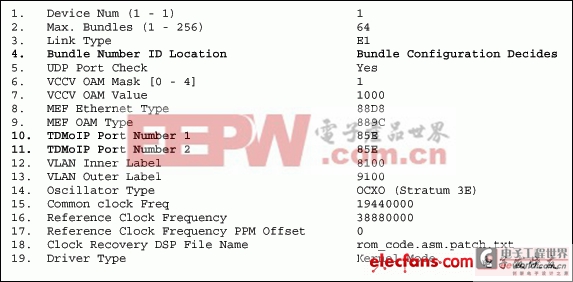如何實現DS34S132與其它TDMoP器件的互操作

圖2. UDP/IPv4報頭。
表2. IPv4報頭結構
| Field | Description |
| IPVER | IP version number; IPv4 IPVER = 4 |
| IHL | Length in 32-bit words of the IP Header, IHL = 5 |
| IP TOS | IP type of service |
| Total length | Length in octets of IP Header and data |
| Identification | IP fragmentation identification |
| Flags | IP control flags; must be set to 010 to avoid fragmentation |
| Fragment offset | Indicates where in the datagram the fragment belongs; not used for TDMoP |
| Time to live | IP time-to-live field; datagrams with zero in this field are discarded |
| Protocol | Must be set to 0x11 to signify UDP |
| IP Header checksum | Checksum for the IP Header |
| Source IP address | IP address of the source |
| Destination IP address | IP address of the destination |
表3. UDP報頭結構
| Field | Description |
| Source port number, destination port number | Either the source or the destination port number holds the bundle identifier. The unused field can be set to 0x85E (2142), which is the user's port number assigned to TDMoP by the Internet Assigned Numbers Authority (IANA). For UDP/IP-specific OAM packets, the bundle identifier is all 1s. |
| UDP length | Length in octets of UDP Header and data |
| UDP checksum | Checksum of UDP/IP Header and data. If not computed, it must be set to zero. |
根據IANA規定,UDP報頭的目標端口應設定為0x85E (2142),這是分配給TDMoP的用戶端口號。Maxim TDMoP器件默認遵循該規范。
部分TDMoP廠商在UDP報中的目標端口號位置分配一個綁定標識號,而不是在源端口號位置。有些廠商還分配一個隨機號作為用戶端口號,而不是采用IANA分配的0x85E。使用DS34S132時,用戶可采用兩種方式解決這些問題。
- 在預配置菜單中,將全部綁定標識號賦予相應的位置。
- 向綁定引擎表明綁定標識號在接收數據包中的位置。


- RTP報頭互操作性
RTP報頭

Field Description V RTP version; must be set to 2. P Padding bit; must be set to 0. X 
相關推薦
-
soothmusic | 2012-05-06
-
-
star800 | 2007-09-29
技術專區



評論